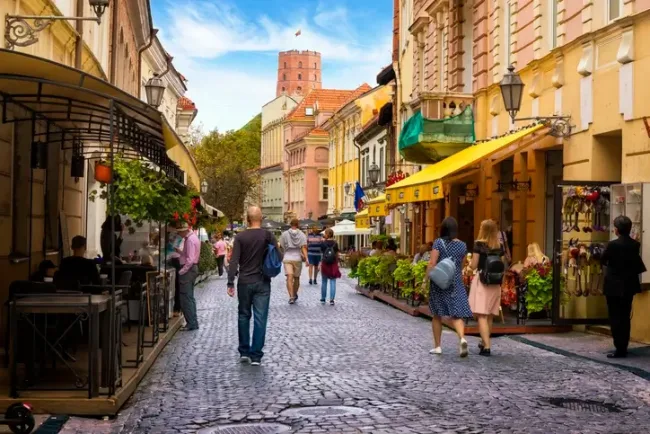
Lithuania
Welcome to Lithuania
Traveling to Lithuania? You may need a visa – find out if you do, which type, and how to apply so you can get the paperwork out of the way and focus on your trip.

What's a Lithuania Schengen Visa, and who's it for?
Who's the Lithuania Schengen Visa for?
Travelers from over 100 eligible countries can apply for a Lithuania Schengen Visa.
Who's not eligible for the Lithuania Schengen Visa?
Residents of the European Union and nationals of Schengen countries can travel visa-free within the Schengen Zone, as well as some other visa-exempt nationals.
What's the purpose of the Lithuania Schengen Visa?
-
Tourism
-
Visiting family and friends
-
Attending business meetings, conferences, or other business activities
-
Doing a short recreational course or training
-
Medical treatment
How long can you stay with a Lithuania Schengen Visa?
The visa allows a stay of up to 90 days within 180 days in the Schengen Area. It's valid for a period ranging from 180 days to 5 years, determined by the embassy based on your travel history and personal circumstances.
Learn more about the Lithuania Schengen Visa
What's a Lithuania ETIAS, and who's it for?
Who's the Lithuania ETIAS for? Travelers from countries that don't need a visa to visit Lithuania and other participating countries.
Citizens from over 60 visa-exempt countries must apply for ETIAS authorization, including the United States, the United Kingdom, Canada, Australia, New Zealand, Brazil, Japan, and Singapore.
Who's not eligible for the Lithuania ETIAS?
-
Citizens from countries requiring a visa to enter the Schengen Area.
-
EU/EEA/Swiss citizens as they enjoy freedom of movement within the Schengen Area and don't need any visa or authorization.
-
Individuals with an outstanding entry ban or alert in the Schengen Information System.
-
Travelers who don't meet the security and entry criteria the ETIAS system determines.
What's the purpose of the Lithuania ETIAS?
To pre-check travelers from visa-exempt countries before they enter participating countries, including Lithuania, for security reasons and to make the entry process quicker and easier.
How long can you stay with a Lithuanian ETIAS?
The ETIAS authorization allows for short-term visits, typically up to 90 days within 180 days. It's valid for multiple entries within 3 years or until the end of the validity of the passport registered during the application, whichever comes first.
We'll update this page as soon as ETIAS is implemented in 2025.
What are Lithuania's long-term visa options?

Lithuania offers several long-term/national visa options for various purposes, such as employment, study, business, and residence. Here are some of the most common visas:
-
Work-based residence permit: Work permits are usually issued for one year. It allows a foreigner to apply for a national work visa as a seconded, seasonal worker or crew member of a ship.
-
Residence permit: This document entitles a foreigner to reside permanently in the Republic of Lithuania, typically after a temporary stay.
At iVisa, we currently don't offer the above visas, but you can find out more on the Lithuanian government website.
Staying healthy in Lithuania: Here's what you need to know
Here's a concise overview of health-related information for travelers heading to Lithuania.
Make sure to stay updated on routine vaccines
-
Keep updated with Lithuania's COVID-19 requirements, such as quarantine, testing, or vaccine certificates, through your airline or the Lithuanian government website.
-
Ensure your routine vaccinations (measles, mumps, rubella, diphtheria, tetanus, whooping cough, chickenpox, polio, and your yearly flu shot) are up-to-date before traveling.
Medical facilities
-
Lithuania offers a high standard of medical care, particularly in major cities like Vilnius, Kaunas, and Klaipėda.
-
The availability of certain specialized treatments may be more limited than in some Western countries.
-
Pharmacies are widely available, and most common medications are accessible. Some may require a prescription from a local doctor.
Health insurance
We'd always recommend taking out health insurance before traveling to any destination.
Contact your insurance provider before traveling to ensure you have the right level of coverage.
Other things to consider:
-
Trip cancellation, delay, and interruption benefits.
-
Medical expenses and medical evacuation benefits.
-
Baggage coverage.
Things to be aware of when visiting Lithuania
Keep an extra eye on the following to stay healthy and safe during your trip to Lithuania:
1. Ticks: There's a risk of tick-borne encephalitis, especially in rural and forested areas, from spring to autumn. Lyme disease is another tick-borne risk. Using insect repellent with DEET is recommended to prevent tick bites.
2. Food and water safety: Generally, food and water standards in Lithuania are comparable to those in the rest of the European Union. It's advisable to consume bottled or treated water if you're in remote areas.
3. Air quality: Urban areas can experience elevated pollution levels, which might affect individuals with respiratory conditions.
Medication for personal use
Follow these tips to bring some over-the-counter medicines into Lithuania:
-
Declare all medications: Report all medications for personal use to the customs authorities.
-
Original packaging: Always keep medicines in their original containers and transparent bags in your hand luggage.
-
Prescription or doctor's letter: Present the medical prescription issued by your doctor or other competent authority in English.
-
Check for restrictions: Call Lithuania's embassy to verify that all of your prescriptions are legal to bring with you.
-
Quantity aligned with itinerary: Bring only a reasonable quantity that aligns with the duration of your stay to avoid complications.

 Australia ETA Online
Australia ETA Online
 United Kingdom ETA
United Kingdom ETA
 India Tourist eVisa
India Tourist eVisa
 Canada ETA Visa
Canada ETA Visa
 Turkey eVisa
Turkey eVisa
 Egypt eVisa
Egypt eVisa
 Singapore SG Arrival Card
Singapore SG Arrival Card
 Indonesia eVoa Visa
Indonesia eVoa Visa
 Aruba ED Card
Aruba ED Card

